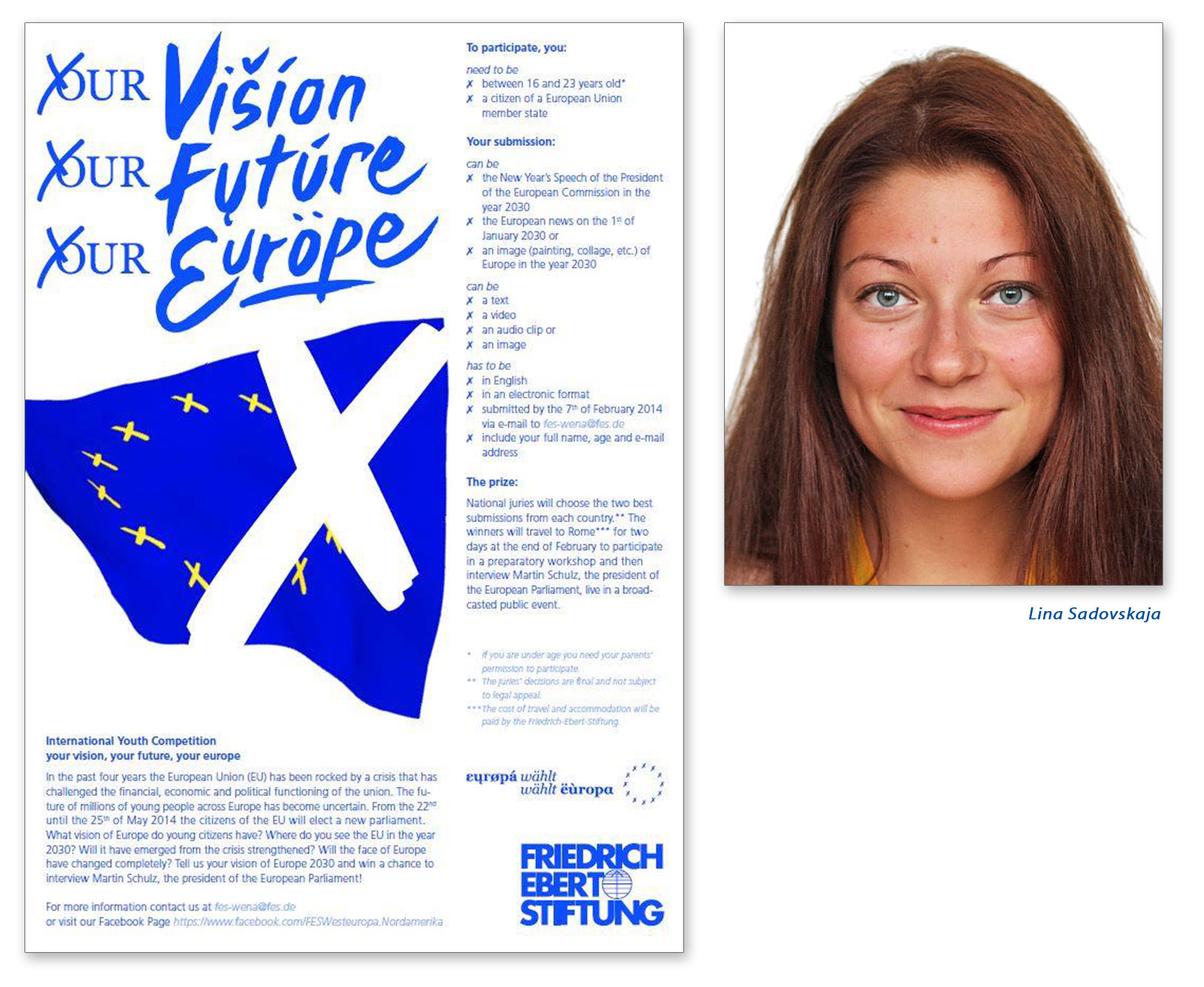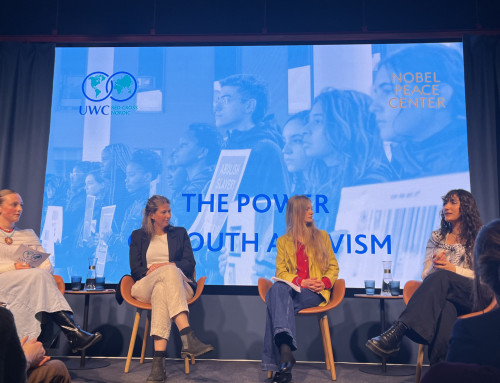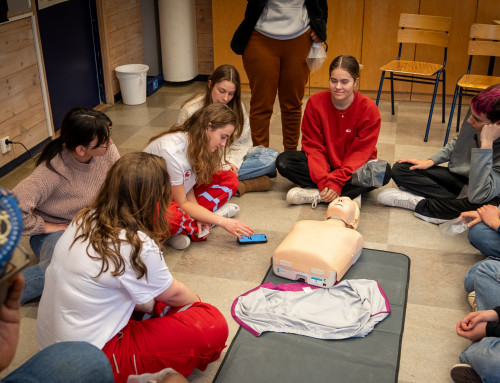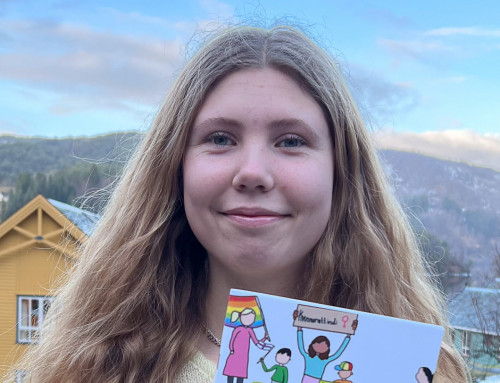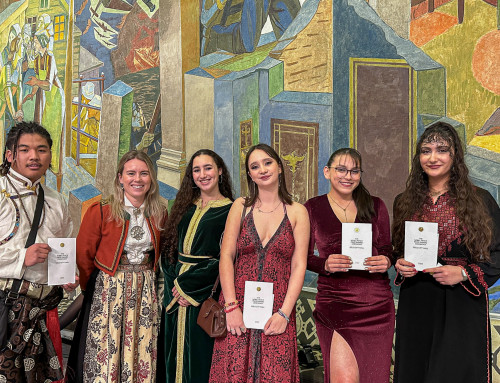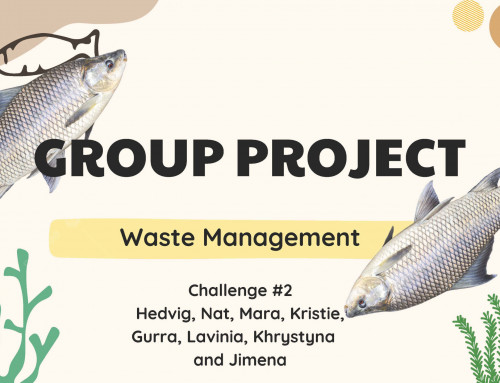Second year student Lina Sadovskaja from Lithuania entered a competition sponsored by the ‘Friedrich Ebert Stiftung’ a German foundation serving the following aims:
- furthering political and social education of individuals from all walks of life in the spirit of democracy and pluralism,
- facilitating access to university education and research for gifted young people by providing scholarships,
- contributing to international understanding and cooperation.
The competition offered several options for participants and the one Lina chose was to write an essay outlining a vision of Europe in 2030. A winning submission would be rewarded with a two-day trip to Rome, preparatory workshops, and an interview with Martin Schultz, the President of the European Parliament.
Lina wrote the New Year’s speech by the President of the European Parliament for 2030 and we are very pleased to say that she was selected to travel to Rome as one of the competition winners.
Here is what Lina wrote:
Excellencies, Ladies and Gentlemen,
Dear friends,
I am honored and delighted to be able to welcome the New Year together with you, the citizens of the European Union and the members of the European Commission.I thank you for providing me with an opportunity to address the entire European Union as I could hardly imagine a better time to say a few words about the challenges and responsibilities we will be facing in the year to come.
Every decade has demanded a different European Union. However small the differences in our legislation now and then, every struggle has strengthened the foundation which our multidimensional organization is built upon. Our success in tackling these detrimental problems has finally left us with time and resources to deal with an issue more critical and no longer escapable. The predictions, which were questioned 20 years ago, can no longer be questioned. Climate change is no longer disputable. 2030 and the following years will be dedicated to an issue neglected for too long. Energy sustainability and climate change will be a priority the coming decade.
In 2015 with the newly elected parliament, a new economic direction was taken and a long-term economic commitment to the debt reduction of the member states in crisis was made. Through supranational economic governance and unified legislation, we were able to collaborate and create more than 24 million jobs and reduce the unemployment rates of those countries by almost a third. This type of achievement was only possible because of every single contribution made from the other member states of the European Union.
In 2021 following Lithuania and Latvia, Iceland and Macedonia’s entry into the Euro-zone, Ukraine was introduced as a candidate member. The economic strains of further enlargement of the union became the vocal point of parliamentary reform on redistribution of the EU structural funds and migration policies. Yet again, through collaboration and distribution of political and economic responsibility, the EU member states have been successful in transporting stability to more countries in Europe.
Now in 2030, collaboration will be the essential component to revamping our environmental efforts. Although many countries had pledged to phase out their nuclear plants, some of these promises were never kept. It is hard to reach a system of justice when the efforts and responsibility taken varies within the Union and members fail to live up to their expectations. While countries like Sweden, Latvia and Iceland have already surpassed the renewable energy targets set for 2020, others have trouble fulfilling the goals of 10 years ago. It is clear that new efforts have to be made. The only way the European Union can combat the climate change in the following years is to promote the renewable energy sources and guarantee the independence from the external energy sources. I cannot stress the importance of EU’s GDP investment in the research and development of alternative energy sources enough.
There are three things that have to be done:
1) fulfillment of the old energy development and environmental targets;
2) creation of a truly competitive internal energy market;
3) investment in energy infrastructure of the member states with lower GDP rates;
We all need to pressure our elected officials to treat this issue with importance. How can we expect a stable economy if it is dependent on finite resources? It is time to make the EU as independent as possible not only in the coming year but in the coming decade.
I am honored to share this New Year resolution with you and make the environment and environmentally conscious energy development a priority in the politics of the European Union of the coming decade.
31 December 2029
Many congratulations to Lina. We look forward to hearing about the trip to Rome.

